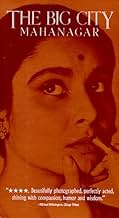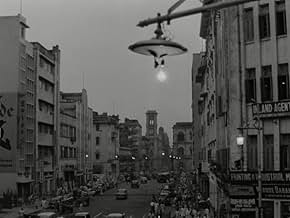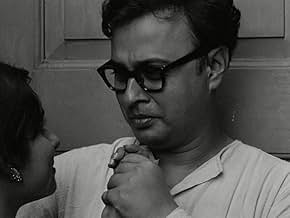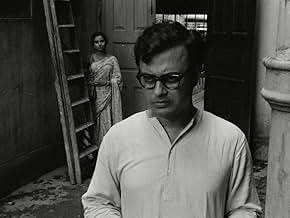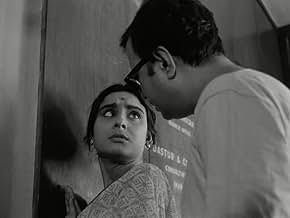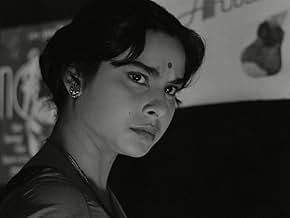La vie à la maison change quand une femme au foyer d'une famille traditionnelle de la classe moyenne à Calcutta obtient un emploi de vendeuse de porte-à-porte.La vie à la maison change quand une femme au foyer d'une famille traditionnelle de la classe moyenne à Calcutta obtient un emploi de vendeuse de porte-à-porte.La vie à la maison change quand une femme au foyer d'une famille traditionnelle de la classe moyenne à Calcutta obtient un emploi de vendeuse de porte-à-porte.
- Prix
- 4 victoires et 1 nomination au total
- Arati Mazumder
- (as Madhabi Mukherjee)
- Bani
- (as Jaya Bhaduri)
- Sarojini (Subrata's Mother)
- (as Shephalika Devi)
- Himangshu Mukherjee
- (as Haradhan Banerjee)
Histoire
Le saviez-vous
- AnecdotesFifteen-year old Jaya Bhaduri's (later known as Jaya Bachchan) film debut and her only film with Satyajit Ray.
- GaffesWhen Priyogopal (Subrata's father) goes to visit his student Anupam Roychowdhury to ask for money he is shown having a conversation with Anupam in his office. When he is explaining his circumstance the camera shows him only sitting on a chair with his walking stick. In the very next scene when all the three characters are shown (third one being Anupam's wife ) the top of his walking stick has changed direction. The round bit on top was towards the right before and is turned to the left in the very next scene.
- Citations
Arati: You wouldn't recognize me on the job.
Subrata Mazumdar: What about at home? Would I recognize you at home?
Arati: You don't recognize me? Tell me honestly.
[Subrata shakes his head no]
Arati: Why not?
Subrata Mazumdar: It all feels a bit unfamiliar. It feels a bit...
Arati: What about this?
[points at her cheek]
Arati: You don't recognize my mole? I'm still the same housewife.
- ConnexionsReferenced in Creative Artists of India: Satyajit Ray (1964)
The story follows Arati's acclimation with her job as a sales woman, her growing independence, and her new relationships with people from different social and financial classes, one example being a young Anglo-Indian colleague named Edith whom she befriends. The real conflict, however, does not happen when Arati's in-laws start a silent "cold war", but when her husband himself loses his own job and Arati becomes the sole breadwinner of the family. Subrata loses self-respect and is filled with negative feelings of inferiority and shame.
This is the story of Satyajit Ray's extraordinary classic 'Mahanagar', a poignant, quiet and moving picture which depicts a whole world of conflicts resulting from modernisation and changing social and generational norms. Ray's portrayal of the urban India, its lifestyle and people, is brilliantly done. Everything about the film is, as expected, very authentic, very real and very easily identifiable with Ray's style of film-making. He makes the proceedings and the characters very interesting and very easy to relate to.
The film deals with the struggle of middle-class families to survive in the big city through their everyday hardships, but in the process, shows the gender role conflicts and criticises the hypocrisy of traditional conservativeness. One such instance is shown when Arati's father-in-law, a retired teacher who had complained that he was in need of a new pair of spectacles, now prefers going and begging from his former student rather than accepting money from his working daughter-in-law who 'breaks tradition'.
The relationships in Mahanagar are perfectly portrayed, whether it's Arati's relationship with her husband, with her kid, with her in-laws, with her employer. But the best thing about it is the portrayal of Arati's acquaintance with her new self. Her job provides her with confidence and self-belief as she grows increasingly independent, both socially and economically. Mainly due to her friendship with the Anglo-Indian Edith, who she would later stand up for, Arati learns to use lipsticks, wear dark fashionable glasses, speak more assertively and stand up against injustice, while still maintaining her individuality as a simple, unselfish woman.
Madhabi Mukherjee is astonishing as Arati. She is a natural beauty, and acts with grace and dignity. She convincingly transforms from a simple housewife into a modern and smart woman of substance, always letting the viewer sense her struggle, confusion and pain. Anil Chatterjee is great as the slightly embittered yet loving husband. Jaya Bhaduri is completely lovable and charming in her debut role. Prasenjit Sarkar is cute as a button as Pintu. Vicky Redwood is quite nice though her line delivery is often weak. Haradhan Bannerjee is very sympathetic as Arati's boss though his character is slightly prejudiced.
Mahanagar is another example of Ray's indelible craftsmanship, of his superb storytelling and his exceptional ability to tell a universal story which is both moving and educative in a simple yet very effective way. The film's pace may be a bit slow, but it is steady enough, and the picture remains thoroughly and consistently engaging and captivating. The ending is bittersweet - sad yet optimistic, satisfying and inspiring. Mahanagar is overall a beautiful social drama; a classic and fascinating piece which is highly recommended.
- Peter_Young
- 12 mars 2010
- Lien permanent
Meilleurs choix
- How long is The Big City?Propulsé par Alexa
Détails
- Date de sortie
- Pays d’origine
- Site officiel
- Langues
- Aussi connu sous le nom de
- The Big City
- Lieux de tournage
- RN Mukherjee Rd, Calcutta, Bengale occidental, Inde(closing shot: view of the city)
- société de production
- Consultez plus de crédits d'entreprise sur IMDbPro
- Durée2 heures 16 minutes
- Couleur
- Mixage
- Rapport de forme
- 1.37 : 1
Contribuer à cette page



